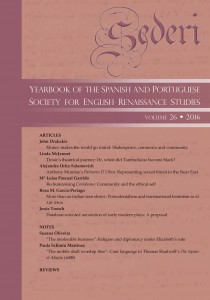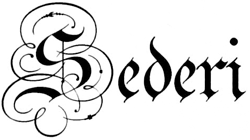
Sederi 26
Sederi 26 — 2016
EDITOR
Ana Sáez-Hidalgo
MANAGING EDITOR
Francisco J. Borge López
REVIEW EDITOR
María José Mora
ISSN 1135-7789
Paula Schintu Martínez, “‘The Mobile Shall Worship Thee:’ Cant language in Thomas Shadwell’s The Squire of Alsatia (1688).” SEDERI 26 (2016): 175–193.
DOI: https://doi.org/10.34136/sederi.2016.8 Download PDF
Abstract
The dramatic increase in criminality in sixteenth-century England was behind the emergence of a new type of literary work known as “rogue literature,” which dealt with the life and activities of beggars and lawbreakers. These rogues’ language, cant, became a major concern for many authors, who attached glossaries to their works for the benefit of those who were not familiar with it, marking the beginning of canting lexicography. It is within this framework that Thomas Shadwell (1640–1692) wrote his famous The Squire of Alsatia (1688), which is the focus of this study. This paper explores the use of cant language in this celebrated play from a linguistic and lexicographic point of view, arguing that its profuse employment of canting terminology, much of which is first documented in the play, made a significant contribution to studies in canting lexicography and proved its reliability as a historical portrait of seventeenth-century English cant.
Keywords: Canting lexicography; Thomas Shadwell; The Squire of Alsatia; cant language; seventeenth century.
References
Primary sources
Lancashire, Ian, ed. 2006. Lexicons of Early Modern English. University of Toronto Press. Accessed 28 June 2016. http://leme.library.utoronto.ca/.
Profitt, Michael et al., eds. 2000. Oxford English Dictionary Online. Oxford University Press. Accessed 28 June 2016. http://www.oed.com/.
Shadwell, Thomas. 1688. The Squire of Alsatia. London: Printed by James Knapton. Early English Books Online: English Prose Drama Full-Text Database.
Secondary sources
Bennett, Kate. 2004. “Shadwell, Thomas (c.1640–1692).” Oxford Dictionary of National Biography. Oxford: Oxford University Press.
Blank, Paula. 1996. Broken English. Dialects and the Politics of Language in Renaissance Writings. London: Routledge.
Browne, William Hand. 1913. “Thomas Shadwell.” The Sewanee Review 21 (3): 257–76.
But, Roxanne. 2011a. “‘A Kind of Gibberish Used by Thieves and Gypsies’: The Social Significance of ‘Cant’ in the Eighteenth Century.” Presentation at the Crime and the City Symposium of the Moot Court, School of Law, University of Sheffield, 4 February 2011.
But, Roxanne. 2011b. “Unconventional Language Use in the Past: The Pragmatics of Slang in an Eighteenth-Century Context.” Presentation at the School of English’s Postgraduate Colloquium, University of Sheffield, 23 May 2011.
Cannadine, David, ed. 2004. Oxford Dictionary of National Biography. Oxford: Oxford University Press.
Coleman, Julie. 2004. A History of Cant and Slang Dictionaries. Volume I: 1567–1784. New York: Oxford University Press.
Gaby, Rosemary. 1994. “Of Vagabonds and Commonwealths: Beggars’ Bush, A Jovial Crew, and The Sisters.” Studies in English Literature 34 (2): 401–24.
Gotti, Maurizio. 1999. The Language of Thieves and Vagabonds: 17th and 18th Century Canting Lexicography in England. Tübingen: Niemeyer.
Noyes, Gertrude E. 1941. “The Development of Cant Lexicography in England, 1566–1785.” Studies in Philology 38: 462–79.
Staves, Susan. 1993. “Recent Studies in the Restoration and Eighteenth Century.” Studies in English Literature 33 (3): 659–703.
